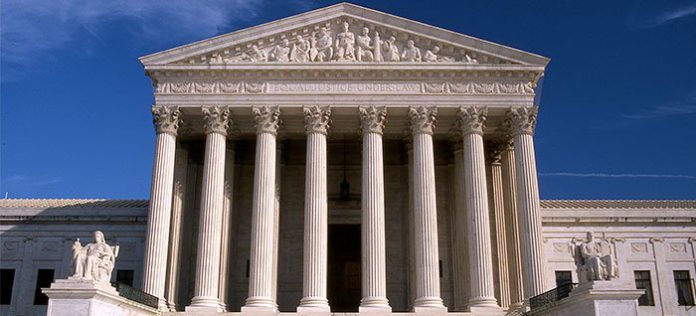

Supreme Court Justice Anthony Kennedy punctuated an already rousing end to the court’s session last week — which included a 5-4 decision upholding President Donald Trump’s travel ban and another knocking public-sector unions — by announcing his retirement. A somewhat moderate conservative long considered the court’s key swing vote, Kennedy’s departure leaves room for Trump to pull the group further right, perhaps reshaping the collective ideology of the country’s highest court for the next several decades.
Shortly after Kennedy broke the news last Wednesday, Trump told reporters he would “begin immediately” searching for a new justice. The president indicated he would again pull from an existing shortlist of 25 candidates compiled during the 2017 nomination process that led to the selection of former 10th U.S. Circuit Court of Appeals Justice Neil Gorsuch — a list that includes two other Coloradans from the 10th Circuit, Judges Allison Eid and Timothy Tymkovich.
“This is a watershed moment in American constitutional history,” said Alan Chen, a professor at the University of Denver’s Sturm College of Law. “Justice Kennedy was a critical justice at the fulcrum of a sharply divided court and is stepping down at a time when national politics are ideologically divided in extreme ways.” Chen added, “What [Kennedy’s retirement] will leave in its wake is a frenzy over the nomination by president Trump; it’s likely to be a much sharper confirmation battle than there was over Justice Gorsuch.”
Following the sudden death of Justice Antonin Scalia in 2016, Senate Majority Leader Mitch McConnell successfully blocked then-President Barack Obama’s nominee, Justice Merrick Garland, refusing to hold hearings or even meet with Garland. McConnell frequently argued that the vacant seat should not be filled during an election year and that “the American people should have a say in the court’s direction.” After Kennedy’s announcement last week, however, McConnell vowed to hold a vote on a replacement this fall, saying from the Senate floor, “The Senate stands ready to fulfill its constitutional role by offering advice and consent on President Trump’s nominee to fill this vacancy.”
Colorado Senator Cory Gardner was quick to publicly tout Eid, who was elevated to the 10th Circuit court last year and previously served as a law clerk for Supreme Court Justice Clarence Thomas; on Thursday, Gardner sent a formal letter to Trump citing Eid as a strong candidate and urging her selection. But Chen said he thinks it’s unlikely Trump will choose another 10th Circuit judge. (Prior to Gorsuch, it had been nearly 50 years since a president had appointed someone from the 10th Circuit to the Supreme Court.)
Regardless of who Trump selects from the shortlist, the new justice will almost certainly push the court ideologically further to the right. “Everyone on this list is to the right of Kennedy, and I think that will be the goal,” said Sean Connelly, a Denver appellate attorney and former Colorado Court of Appeals judge. “Justice Kennedy is a moderate conservative who upset hardline conservatives with his willingness to protect reproductive freedoms, marriage equality, and some prisoner rights.”
In making past Supreme Court selections, presidents have taken into account factors such as a candidate’s background as well as geographic and professional diversity. Chen said he thinks this selection will be more narrowly focused. “Kennedy isn’t a liberal by any means, but he was the deciding vote on a lot key social issues,” he said. “I think ideology is the only thing that’s going to matter with this appointment. They’re almost overt about it; it’s really just pure power at this point.”
To confirm Gorsuch last year, the Senate enacted the so-called “nuclear option,” changing the chamber rules so that Supreme Court judges could be confirmed by a simple majority, rather than the previously required 60 votes. That rule change means Democrats, who currently hold 49 senate seats, have seemingly few routes to hold up any Trump nominee. “The situation with Trump is unique not only because he has two appointments so early in his term,” Connelly said, “but also because his appointee goes before a Republican-controlled Senate willing to use a nuclear option to confirm with the votes of just fifty Senators.” No president dating back to at least Bill Clinton has appointed two Supreme Court judges during his first two years in office.
Chen suggested one option the Democrats might opt for is to attempt to steer the nomination conversation toward women’s reproductive rights. “To be honest, “I think they’ll make this an appointment about Roe V. Wade, which it arguably is,” Chen said. “I think that will be one of the mobilizing forces to get more people to care about this particular appointment.” A battle on those terms, Chen suggested, could put pressure on moderate women in the Senate. Back in 1992, Justice Kennedy sided with liberal judges in a vote that upheld Roe V. Wade, which ruled access to abortion is a Constitutionally protected right.
Litigation attorney Andy Baak of the Denver firm Bartlet Beck served as a clerk for Justice Kennedy during the court’s 2004-2005 session. Beck described Kennedy as “unfailingly polite and warm, with a great sense of humor” and “a true gentleman in the best sense of the word.” Baak recalled that during those years he had a newborn and remembered sending the birth announcement to Kennedy, who responded by sending Baak a signed copy of the Constitution as a baby gift.
Baak said that although Kennedy will likely be remembered as having occupied the middle of the court for much of his tenure, he noted a very consistent thread in Kennedy’s jurisprudence was his strong commitment to the First Amendment.
“Regardless of whether you agree with the Justice on any given issue, he’s a wonderful person — very warm and generous — who cared deeply about the court as an institution and the rule of law in general,” Baak said. “I would expect in his retirement he’d continue to dedicate himself to speaking on those issues.”
— Chris Outcalt

